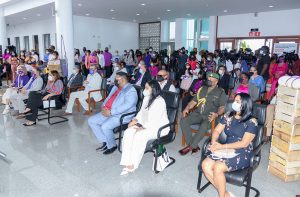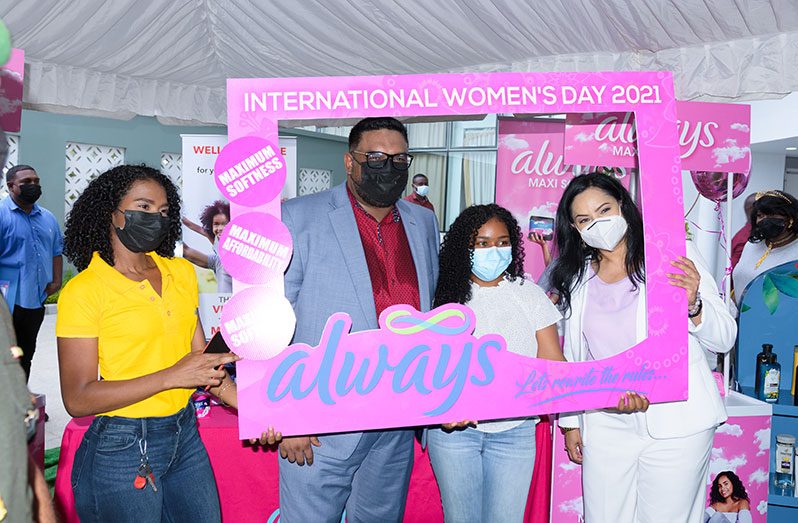–says President Ali
–commits to building economic, political, social and cultural platform
SOCIETAL constraints, some of which date back to ancient days, continue to hinder the progress of women, and although they have been breaking the glass ceiling in almost every sphere of society, there is need, locally, for a national approach which mainstreams issues and challenges of women into a policy framework.
Gone are the days of mere rhetoric, as women are taking it on their own to fight for their rights and revolutionise the way society views their roles in not just family life, but development at every level. But, with some opportunities and policies still being skewed negatively in their favour, it is important for there to be a multifaceted approach to development, which includes both men and women, and a national strategy.

Greater participation, empowerment, enhanced livelihood options, a more secure environment, stronger families and better institutions are all components of a national framework, which would address, in a holistic manner, the challenges of women, President, Dr. Irfaan Ali, has said.
“The new generation of women, many of whom we saw earlier are starting at a far superior level than those before them. They are starting on a far better platform, but they cannot relax. That is why I think from a government perspective, from a societal perspective, we have to look at a national approach in which we mainstream issues and challenges of women into the policy framework of the country itself,” President Ali reasoned during the launch of the “WE LIFT” Women’s Empowerment Expo at the Arthur Chung Conference Centre, on Saturday.
At the launch of the two-day event, which was organised to commemorate International Women’s Day, celebrated globally today, President Ali said that it is time to move the national agenda forward.
“We need a national framework,” the President posited, noting that Guyanese women are strong, driven and committed, so more needs to be done to not only promote their interests, but to give them opportunities to progress.
The platform, he said, has to be built on an economic, political, social and cultural basis, to support ‘even’ development. Building such a platform would, however, require the nation to relook at the existing framework, so that the outlined objectives could be achieved. One particular impediment which a revised framework would have to address is the difficulties women, particularly single-parent mothers, face in accessing loans from commercial banks.
“In order to break this cycle, we have to sit with the banking sector to develop an incentive regime for women to get loans and start their own businesses,” President Ali said.
Dismantling this road-block would be a step towards the overarching goals of empowering women and reducing any remnant of power gaps, gender bias and other disparities which may exist.
“I don’t have the capability to understand the level of challenges that a woman would go through in her life cycle… but women have in them the potential to do anything,” the Head-of-State said, noting that not only are women designed stronger than men, but they also exhibit an “inner soul” which is transformational and essential in any society and in any country.
And, although women have been resilient in the face of many adversities, Minister of Human Services and Social Security, Dr. Vindhya Persaud, said the world is still a “dark and dangerous” place for women and girls, and this is justified by the many reported cases of rape and domestic violence.
“We need to put ourselves in the position of women who feel threatened and violated… it is incumbent on us as persons, who have the ability to do so, to rally around women and girls and speak out… the network cannot be women alone, it must comprise men who are ready to walk with us,” Minister Persaud said.
In paying tribute to all the women who have defied the odds and surmount the adversities, she said it is time the women of today and people the world over, challenge all the different elements that confront women.
“We are moving towards equality in every sense. We are seeking to see more women lift their voice in advocacy, we are looking to see the participation of more women at national levels and in leadership positions, whether in the home, in the community or wider country,” Dr. Persaud said, noting: “Equality does not mean women replacing men, it means we are able to see each other’s perspective and work together to achieve common goals.”
President Ali said too that there needs to be national change, noting: “We cannot change this country community by community, unless we develop a family, unless we sit as families. We change the way families think. And when you combine that change you get community change, then you get national change. The value of more empowered families is important in advancement of women. Also, stronger families are critical in supporting women.”
Important too in moving forward with stronger families, is establishing mechanisms to protect women from domestic violence. One such mechanism, a Gender-Based Violence (GBV) Service Guide App, was launched at the WE LIFT expo.
The app gives the average Guyanese woman resources at her fingertips, to learn more about the resources available to counter domestic violence.



.jpg)








